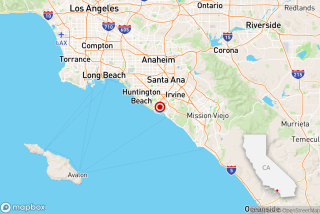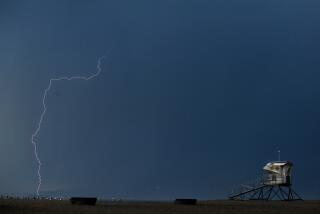Tornado weather in Southern California? It’s not Kansas, but we have twisters too

Several trees were uprooted in Ventura Harbor Village late Wednesday after a storm brought strong winds, heavy rain and a tornado warning to the region.
- Share via
California isn’t Kansas.
But we do get tornadoes. They are nowhere as big as the killer storms that hit other parts of the country. But they have caused damage — and sparked surprise — from those who assumed tornadoes were one of the few natural disasters not on the state’s danger list.
Southern California got a reminder of this Wednesday night and Thursday morning, when a winter storm produced brief tornado warnings.
Here’s what we know from the pages of The Times:
What happened with this storm?
The first tornado warning was issued late Wednesday for parts of the Santa Barbara County coast, which was hit by powerful winds as well as rain. The warning expired at 10:30 p.m., and there were no reports of damage. But the area saw about 2 inches of rain.
Orange County got its own tornado warning early Thursday after a severe thunderstorm capable of producing a twister was spotted near Laguna Beach and Newport Beach, moving north at 35 mph. The tornado warning was canceled about 10 minutes later after the storm weakened, but residents were jolted awake by the emergency alerts.
The National Weather Service said the Santa Barbara County tornado activity was present between 9 p.m. and 9:30 p.m. and was first detected offshore near Montecito.
“The circulation held together as it reached land, but there were no reports of damage,” the weather service said. Several trees were uprooted in Ventura Harbor Village, however.
The service said small “narrow” tornado touched down near Ventura Harbor, causing downed trees and some minor damage to buildings.
Are there tornadoes in Southern California?
Yes.
The Times has chronicled them for decades. They tend to be small and cause limited only damage, nothing like the killer storms seen elsewhere.
One of the most famous twisters here occurred in 1983. The tornado stripped part of the roof off the Los Angeles Convention Center before roaring south along Broadway, ripping apart houses, smashing brick storefronts and overturning cars. More than 150 buildings were damaged. Thirty-two people were hurt.
In 1991, a twister ripped the roofs off several homes in Irvine.
“This is something out of Iowa or Kansas,” said 63-year-old Jim Sleeper, Orange County’s preeminent historian, told The Times that year.
According to Sleeper’s math, tornadoes are apt to strike some part of Orange County about once every five years.
“Blow off a few roof tiles, that’s what they usually do,” Sleeper said.
One in 1993 caused significant property damage in Lake Forest.
In 2008, two tornado clouds in Riverside County flipped a big rig and derailed a freight train.

In 2014, a tornado touched down in South Los Angeles during a heavy rainstorm. The twister hopscotched over a 10-block span, ripping off a roof and damaging at least five homes.
In 2016, another tornado damaged roofs and parts of up to eight commercial structures in Vernon.
Most California tornadoes originate in the Pacific as winter thunderstorms. As some storms approach the coast, cold air above the ocean mixes with warmer air on land, resulting in the kind of climate instability that can cause tornadoes.
As The Times reported in the 1990s, local tornadoes produce relatively mild F-0 and F-1 tornadoes, which pack winds from 40 to 117 mph and are capable of downing trees, yanking mobile homes off their foundations and damaging roofs. By contrast, the Midwest produces catastrophic F-4 and F-5 events, with winds of more than 300 mph that usually destroy all structures in their paths.
How about hurricanes?
Yes, we’ve had those too. One in 1939 battered Southern California with wind gusts to 65 mph. Forty-five people were killed by flooding throughout Southern California, and an additional 48 died at sea. It’s the only tropical storm to make landfall in California in the 20th century. Read more about that storm here.
Times staff writers Luke Money and Rong-Gong Lin II contributed to this report.
More to Read
Sign up for Essential California
The most important California stories and recommendations in your inbox every morning.
You may occasionally receive promotional content from the Los Angeles Times.











